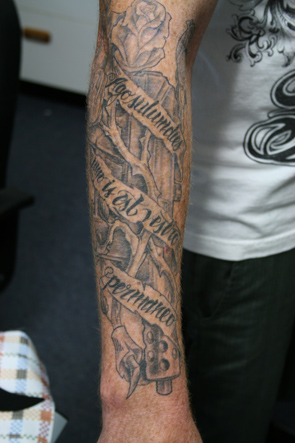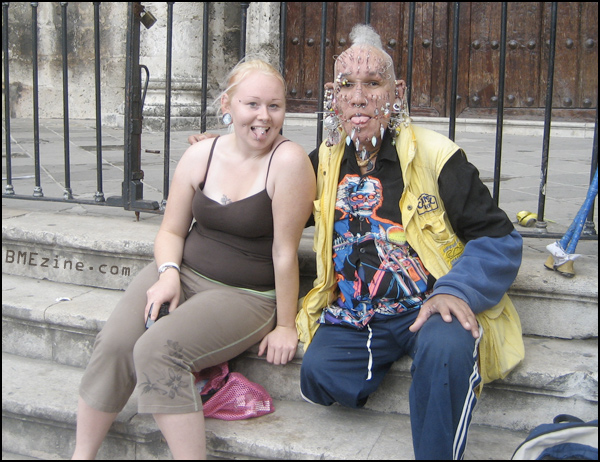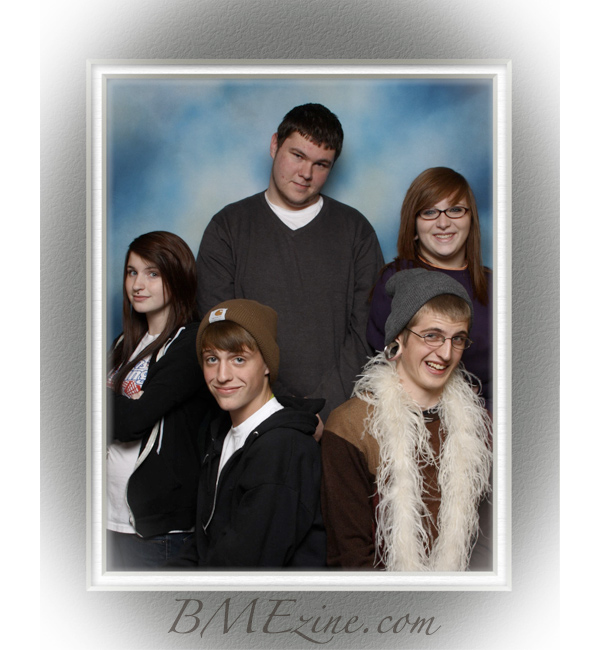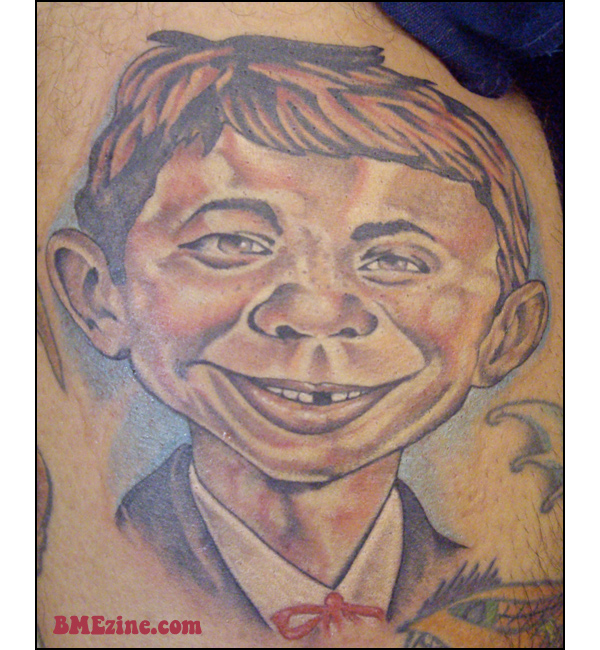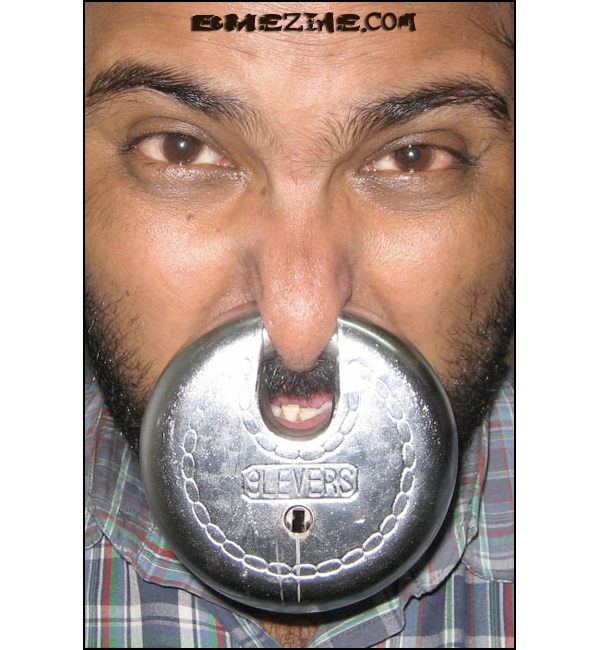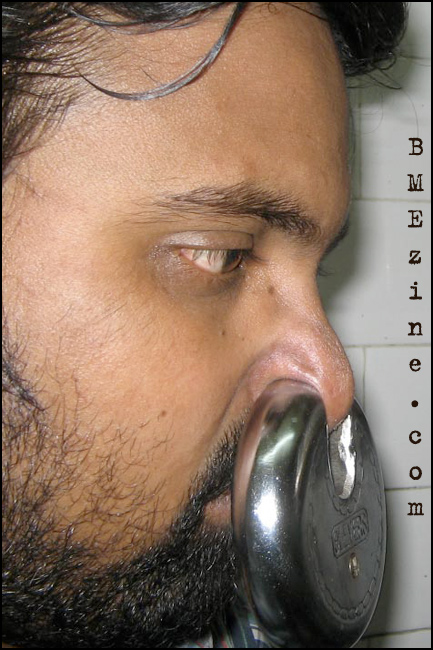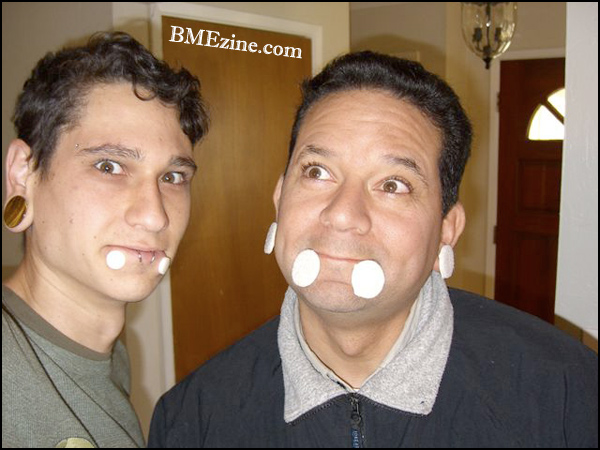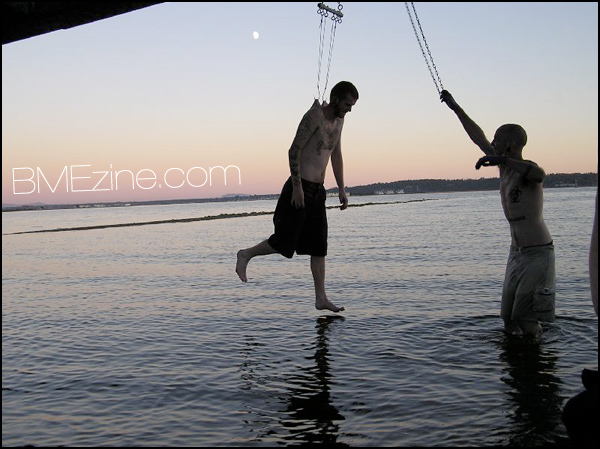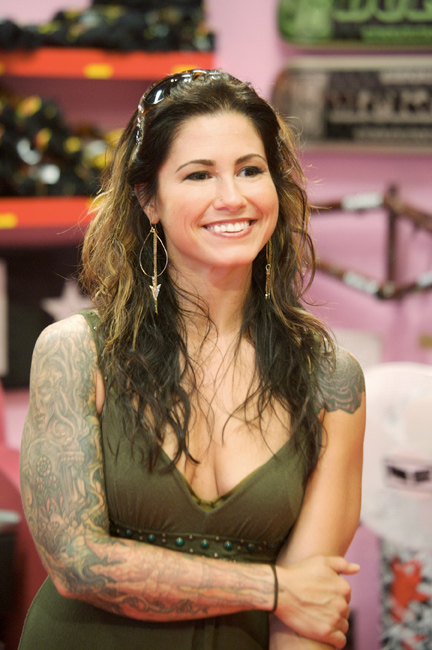
When I call Kim Saigh, she’s just waking up. Hey, understandably — it’s 7 a.m. in L.A., and it’s a Sunday morning to boot. But this is the time she suggested, and she’s apologizing, trying to stifle yawns, insisting that she’s usually awake by now. I tell her not to worry; I’m three hours ahead in Toronto and I can still barely see straight. It turns out that in Kim’s world, 7 a.m. isn’t so bad. When L.A. Ink — the TLC show on which Saigh is a star — is in production (which, luckily it isn’t at the moment), Saigh is often up at 5 a.m. to make sure she has time for yoga before heading into the shop. “It’s such an important part of my life,” she says of yoga, which she claims is as vital to her as tattooing or any other kind of art. “It’s kind of my saving grace.”
For a sleepy woman who hasn’t yet had her coffee or done her yoga, Saigh can sure as hell keep a conversation moving, which is apparently one of the things a person learns to do after being filmed 50 hours a week for three seasons of a television show. When asked if she’d ever done anything like L.A. Ink before signing on, she responds with a hearty “Hell no.” Long before the show, she was the sort of kid who would cry if she had to read a book report to the class, but something about having one’s life broadcast to millions of people helps a person come out of her shell — helps a person stop being the type to jump out of the path of others on the sidewalk. “I don’t tiptoe around people anymore,” she says.
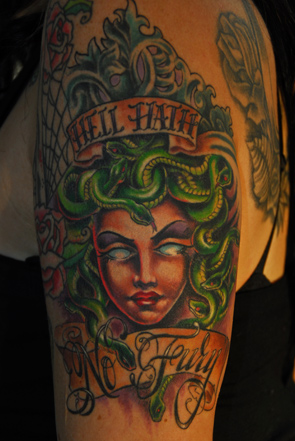 |
But these aren’t the benefits one might predict in such a situation, and it wasn’t an opportunity she initially jumped at. She was ten years into working out of Cherry Bomb, a small, private, off-street level studio she owned with Patrick Cornolo in Chicago’s then-ungentrified Wicker Park neighborhood, and life then was good — no employees, no stragglers strolling in just to check up — when she received a call from Juan Puente, a mutual friend of hers and Kat Von D’s. Kat was looking for girls for a show called L.A. Ink — a sister program to Miami Ink — and wanted Saigh to throw her name in. Saigh was reluctant. “No way,” she remembers saying, “I’d never do that, not in a million years. That’s crazy.” She and Puente argued back and forth, “You’re gonna do it,” “The hell I am,” and so on, until Puente finally told her that he was going to put her name on the list whether she liked it or not. Worst case, she gets a call and then decides to say no. Fine. Whatever. But Cornolo was even less accommodating of her indecisiveness, and told her, again, that she had to do it. Well, when he put it that way, Saigh couldn’t really think of a reason not to do it, other than being shy and scared. It could only do good things for her career, she realized, so if it was just her shyness holding her back? She had to get her ass out there and do it.
Joining the cast was not without its adjustments. Outside of the taping schedule, she’ll book her own appointments as always, but for the show, her clients are more or less picked out for her. She gets to do some level of pre-screening, and won’t often be saddled with something she hates entirely, but she doesn’t quite have veto power, either. In an early episode in the first season, she recalls tattooing a small symbol on a girl to commemorate the client’s battle with an eating disorder, a piece that probably took her all of five minutes, but that had a substantial enough story behind it to warrant inclusion. After the show aired, she got an earful from her friends. “They were calling me and were like, ‘What the fuck?’” Saigh says, “‘You don’t do that shit! What are you doing? It’s making you look bad.’ And I got really self conscious about it. But I also thought, first off, I’m a tattoo artist. I’m not above doing a small tattoo, even though that’s not necessarily where I want to focus my energy. But it definitely made me choosier about what I sign off on.”
The manner in which some requests get tossed out has indeed changed for a person with newfound international visibility. “I’ll look at my tattoo application forms,” Saigh says, “and be like, ‘Really, someone lives in Sydney and wants me to do a wristband.’ Chances are, they’re not gonna fly here. It’s different to eliminate people that way.” It’s the sort of trophy-collecting phenomenon that most “famous” artists will experience: People who want to get tattooed not because the artist is skilled at a particular style the client wants, but rather because they want to be worked on by “Kim from L.A. Ink.” The funny thing, Saigh says, is that people don’t pay as much attention as you’d think. “Some people will come up to me and say, ‘I really love that tattoo you did,’” she says, laughing, “and I’ll say, ‘Uh, Hannah [Aitchison] did that tattoo.’ Or, ‘Corey [Miller] did that tattoo.’ Or people will write in and say, ‘You and Pixie are my favorite artists.’ Well, Pixie doesn’t tattoo. It’s eye-opening in the sense that you really see that you can’t take any opinions too seriously.”
Regardless, Saigh doesn’t quite feel like a celebrity, though maybe that’s because, as she claims, she’s the least recognized of the bunch. “I wear long sleeves,” she says, “I hide my tattoos a lot. Not on purpose — usually, I’m just freezing.” She laughs. “I moved to L.A. and I’m still cold.” Recognition occurs most often at the airport, she says, when she goes through security and has to take off her sweater or coat, and notices people whispering all over. “It makes you a little self-conscious,” she says. It’s almost like people expect her to go over and say hi to them, rather than the other way around. “I’m not going to walk over and say hi to you,” Saigh says. “If you’re not staring at me for the reason I think you’re staring at me, then I’m gonna feel really stupid.” This isn’t uncommon at the shop — people standing near the door, wanting to take her picture, but being afraid to ask. She may come across as rude to some, she realizes, but she’s got her limits: To Saigh, being a celebrity just means somebody you don’t know knows your name. When she was on her own, she knew all of her clients, and they often came by word-of-mouth. Now the common denominator is that they all know her — or, at least, they think they do.
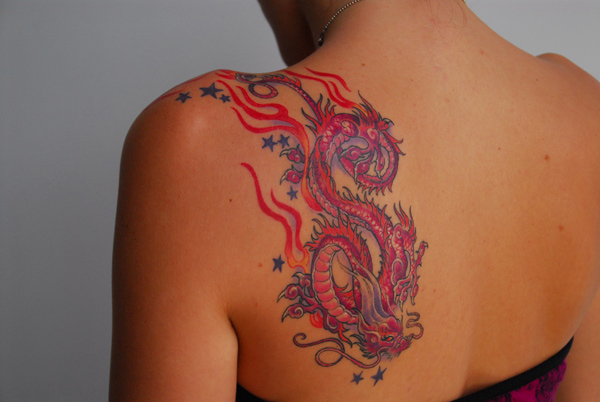
But just as clients assume they know her story, so too is Saigh supposed to learn about them — at least when the cameras are rolling. This can be challenging. For every season, each artist will do about 40 tattoos, 13 of which will make it to air, and it’s not going to be the ones the artists want, necessarily; it’ll be the hot girl, Saigh says, “or the really interesting, sad, touching story.” Such is a pitfall of the tattoo reality show genre: the idea that every tattoo must have a substantial and important story to it. “That isn’t what I’m used to,” she says. “I definitely think the show’s made people feel like they need to have a reason to get tattooed, which is not really what I want to promote. It should have significance, but I always tell people that you should get tattooed because you like tattoos. You do not have to memorialize someone by getting a tattoo — it doesn’t mean you love them less if you don’t.”
Saigh admits that she’s not always as apt to engage a client in the show’s preferred line of questioning as she should be, and then stops mid-sentence. “Oh my God,” she says, speaking of clients’ stories. “I had an awful thing happen the other day.”
Oh?
“I don’t even know if I should tell you. I’ll only tell you if you don’t use it.”
I wear her down on this one.
“Fine,” she says, laughing and cringing as audibly as a person can. “I was tattooing this girl, this really sweet girl who was getting a really cool tattoo, and we were talking.” This was outside of filming hours. “She asks me if the producers have questions for me to ask clients, and I tell her they do, but that I’m bad at it — it’s hard for me to walk and chew gum at the same time, so they definitely need to prompt me a bit. I get really into my work, I tell her, and I’m not much of a talker. I mean, they already know these people’s stories, so if I’m not asking something, they’ll usually nudge me, because I’m just not nosy by nature. I’ll let them tell me, I say, but I’m not going to sit there and ask, ‘So, how big was your tumor?’
“So we sit there for a minute, and finally I ask, ‘Well, while we’re at it, what is the reason you’re getting this tattoo?’ And she says, ‘Well, I had a tumor …’”
Saigh laughs, but her mortification is palpable. Luckily, she says, the client was cool about it, but this is just an example of why the Q-and-A part of the job isn’t always her favorite. “That’s not what I feel like my job is,” she says. “My job is to do a good tattoo. I don’t feel like my job is to pull their demons out or to make ’em cry.”
This sort of exhibition is often cited by tattoo industry professionals who take issue with these sorts of shows — that they commodify the art-form, or that they give the wrong impression about what the tattoo industry is really like, leading to a glut of clients who are getting tattoos because they’re trendy, rather than because they truly love them. “Well,” Saigh says, “the people who are getting tattooed because it’s a trend? It’s like gluing a pair of parachute pants to your ass and saying, ‘I’m gonna wear these forever,’ because they’re the coolest things that ever came out, and those people are going to learn a hard lesson, unfortunately.”
But what about other tattoo artists who bag on the show? “I definitely think a lot of them are big babies,” she says. With the economy the way it is, Saigh reflects on the fact that people are still finding the time to come in and get tattooed, and that tattoo artists are fortunate enough to draw on people all day. “We’re not emptying trash cans, we’re not sitting in cubicles or cleaning bedpans — we draw on people. We have absolutely nothing to complain about.” She says that nobody on the show is full enough themselves to declare them the best in the field, and that they do try to retain as much integrity as possible, and take as much care as possible in terms of how they represent the industry.
As for how she is portrayed on the show, Saigh says that it “shows a side of me that’s very real.” She’s polite, she admits, and easy-going, and pretty happy in general, but there’s definitely more to her that doesn’t always make the cut. “I don’t talk that much,” she says, “and when I do, I’m pretty sarcastic and pretty dry. I like to say things sometimes that maybe I shouldn’t say — but maybe that’s why they don’t put them on there. I think I’m a lot more of a smart-ass than I come across as.”
And that’s a problem?
“Well, I think I’d rather have them make me look nice than make me look like an asshole.”
If there’s one thing the show misses, Saigh feels, it’s the interaction with the audiovisual crew. “That’s the thing that’s the most fun about the show,” she says. “I fucking love our crew. The people I’ve met, camera people, sound people, watching what they do and seeing how they put it together, watching what they look for, watching the monitors, just them being silly — that’s the best part of the show. And it’s the part that the viewing audience will never see.”
But the show has nonetheless been a positive experience for Saigh, if a little strange: Any good artist will notice progression in their work, but very few will have that progression documented and broadcast for millions of viewers around the world — especially when some of the subject matter may not be their first choice. “You have to let go of that,” she says, “and it forces you to take tattoos that may be kind of ehhh and make them exciting. Not that I don’t do that already, but I don’t like to force people to get something more than what they’re asking for. Sometimes, I feel like it’s my job to just be a technician.
“But I think the one thing the show makes you more aware of is that, yes, everybody’s going to see this, so they can watch you trace and color it perfectly, or you can take it to the next level.”
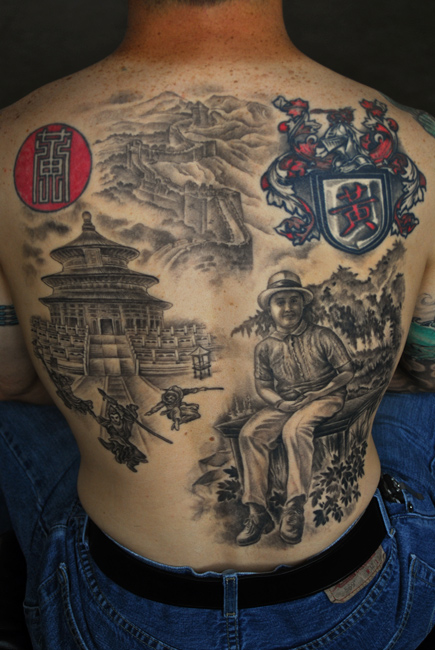
All photos ©TLC (The Learning Channel). Visit Kim online at KimSaigh.com, and to purchase art by her, visit CanvasLA.com.
* * *
Please consider buying a membership to BME so we can continue bringing you articles like this one.




